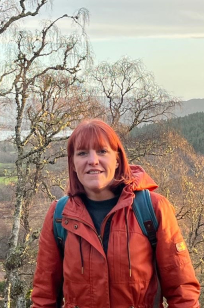Technical / Cooper takes the high road for new role
That’s exactly what Heledd Cooper did this summer, moving from her North Wales home and Liverpool job to take up the position of finance director in NHS Highland.
Ms Cooper (pictured) said she and her husband, both outdoor enthusiasts, had holidayed in the Highlands – driving up in their motorhome – and had the ‘could we live here?’ conversation. But it got no further than holiday imaginings, until the health board role was advertised and the possibility became real.
‘The truth was that it was an opportunity for us personally and me professionally,’ she said. Having started the role in August, Ms Cooper moved into her new home in November.
It is a significant change of environment – just an hour from the spectacular Cairngorm mountains as well as the inner islands. But she says that professionally there are many aspects of the way health and care services are structured that are relatively familiar, having spent several years working the Betsi Cadwaladr University Health Board in North Wales.
Both Wales and Scotland have been operating single system structures for several years, bringing together commissioning and provision and looking to integrate health and social care services more closely.
In many ways, this puts Wales and Scotland (and Northern Ireland with its health and social care trusts) ahead of England, which has only more recently been moving towards integrated care systems.
‘Scotland is more similar to Wales than England,’ says Ms Cooper. This is not just in terms of integration, but size and how the systems are politically driven. But while Scotland has made progress with the integration of health and care services, she says there is more work to do in establishing the National Care Service.
Ms Cooper has worked in England, starting out in 2001 on the national financial management training scheme in the South West of England, before taking roles in
providers and commissioning bodies and holding senior financial leadership positions in the North West Strategic Health Authority as well as NHS England.
She moved to Betsi Cadwaladr as area chief finance officer in 2015 before taking her first board-level executive director of finance role with Liverpool-based Primary Care 24 in 2018.
She says the not-for-profit social enterprise, which delivered exclusively NHS contracts, was a great place to cut her boardroom teeth and to learn about board level leadership.
‘It was a big learning curve,’ she recalls, ‘but they supported me through it and that has prepared me well and made me stronger coming into this role.’
The whole of the NHS faces financial challenges currently. And this is certainly the case for NHS Highland. As of November, it was forecasting a £40m deficit against a planned overspend of £16m. It is being asked to recover its position by the year-end. And Ms Cooper says that next year looks even more difficult – a message that is being echoed by finance directors across the UK.
‘Even if we can get to £16m this year, that is based on £30m of non-recurrent actions,’ she says, giving a difficult starting point for 2023/24.
There are heightened challenges for the Highlands in terms of geography and access to staff, affecting the delivery of both health and social care provision.
But Ms Cooper says there is a bigger challenge. ‘Long-term sustainability is what we really have to focus on,’ she says. ‘And that can be a difficult balance when you are focused on the in-year deficit position.’
However, she says, one of the things that attracted her to the health board was its openness about the journey it had been on, the road ahead in terms of transformation and its determination to find new ways of working.
There are also some structural arrangements that are unique to the Highlands. Most health boards have set up formal integrated joint boards (IJBs) with local authorities to coordinate health and social care services.
Highland Health Board has such a board, but just for part of its area – Argyll and Bute. For the rest of its area, Highlands has a partnership agreement with the Highland Council. The council effectively contracts with the health board for the provision of adult social services. In addition, there is a counter deal for children’s health services.
Ms Cooper says the relationship with the council is arguably the biggest change she faces. ‘But it is all about relationships,’ she says. And this is the same for health and care services across the whole UK.
‘We all face the same issues and the same challenges,’ she says. ‘We are all looking at ways to get activity up post-Covid, to increase community services, embrace digital and care at home opportunities, support faster discharge from hospital and have the right level of care home provision so that patients receive the best outcomes.
‘That hasn’t changed, even if the stunning location makes it look more dramatic!’
Related content
We are excited to bring you a fun packed Eastern Branch Conference in 2025 over three days.
This webinar series offers colleagues of ICS organisations the opportunity to discuss common priorities, challenges, and successes within their field.